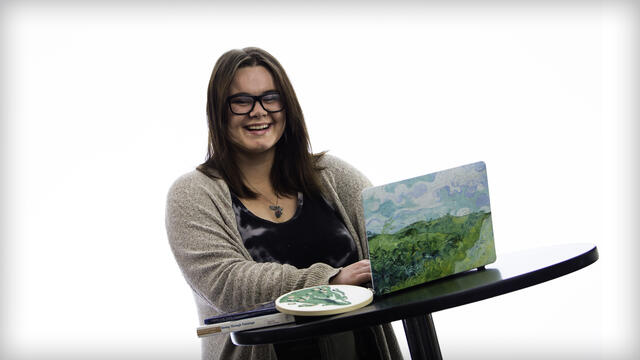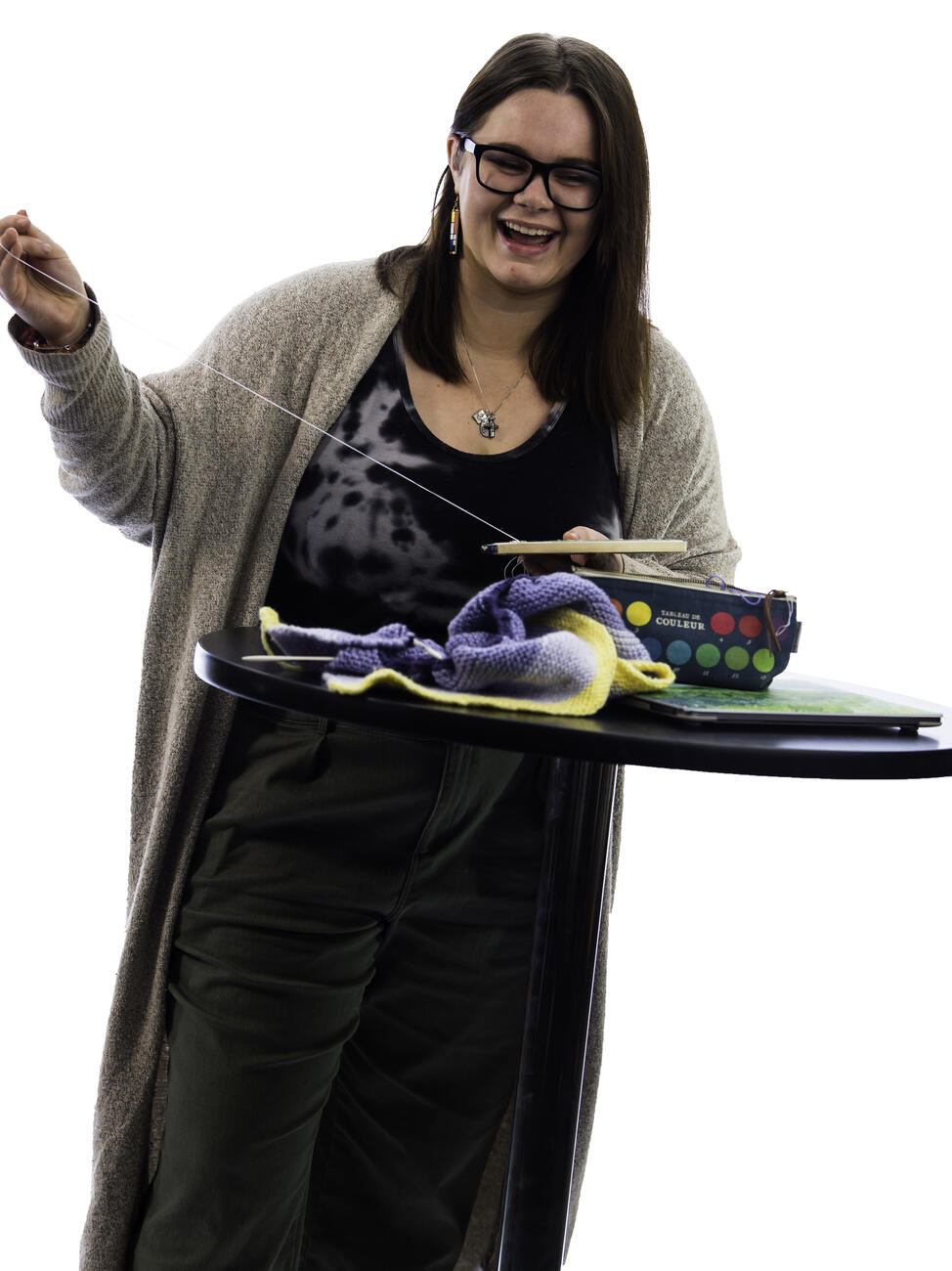Class of 2022: Kaylor Stroot
Kaylor Stroot, a Chemistry major with a passion for art, discovered a career field she hadn’t known existed after talking to Chemistry Professor Dana Ferraris. Now certain of her career as a paintings conservator, Kaylor put her Chemistry knowledge to work in an internship at the Smithsonian and during an arts and science summer program at UMBC. Her pathway into art conservation — and her unique capstone on the effect of aragonite on art deterioration — wouldn’t have been possible without the liberal arts curriculum at McDaniel.

Kaylor Stroot is a Chemistry major from Damascus, Maryland.
When I took my first step on the Hill, I was: In love with the view and how small the campus was. When I was on my first tour, my tour guide ran into a few people they knew, and they said hello to one another. It was nice to know it was a small campus and so tight knit.
The me who will ring the Old Main bell on Commencement Day is: Is someone who is more confident in the person she is, prepared to join the real world, and has found a network of people to support her in her goals and creativity, even when she makes mistakes.
Real world experiences: I have had one internship with UMBC called Summer Research Program in Baltimore at the Interface between Science and Art (SCIART) where I studied what I am doing now for my capstone, and another I am finishing up now working at the Lunder Conservation Center at the Smithsonian working to gain experience in the field as a paintings conservator. I also got to go to Greece for three weeks for Jan Term in 2020, right before COVID hit, and I am still in touch with some friends from the trip. My absolute favorite internship I had was with the Smithsonian, for sure. It was so amazing, and I got to work with so many amazing works of art.
My aha moment: I learned that I wanted to go into a career with art. I always wanted to be a chemistry teacher, but I loved art. Dr. Dana Ferraris is the one who suggested the SCIART internship to me because he knew this, and I ended up changing my career because of it.
Footprints I’m leaving on the Hill: I hope that I am remembered for being someone helpful and friendly to everyone on campus, who stepped up to take on new roles and brought my own twist of creativity into it.
Faculty or staff member who most influenced who I have become: Michael Polen and Gretchen McKay. They both supported me and walked me through changing my major my senior year for a chemistry teacher to an art conservator. I have always been a little impulsive, and they worked with me on such a last-minute change, talked me through my choice, gave career advice, and scheduled meetings with me right away during the middle of summer to make sure it was all communicated well.
Best class ever: The best class ever was Organic Chemistry because Dr. Ferraris broke down such a scary topic so easily for us. He broke it up with these liberal arts lessons that I loved and that taught me how to use a chainsaw over quarantine. There was always an open door for questions and coffee ready on test days, which made you feel supported and not overwhelmed by the class.
My favorite spot on campus: My favorite spot is Amanda Gelber’s and Courtney Cunningham’s offices. They always give the best energy, the best hugs on bad days, and the best tea when I just need to talk things through. They both go above and beyond to give support to students and student workers.
Most mind-boggling idea I learned at McDaniel: I learned how to find commonalities between disciplines that you wouldn’t normally think are connected and how to take skills from one and apply it to another.
My capstone title: “Density Functional Theory and Small Molecule-Protonated Aragonite Surface Interactions as Applied to Historical Conservation.”
What it’s about in plain talk: Aragonite is a form of calcium carbonate and can be found in paint, chalk, marble, and more, leading it to be found in different works of art in museums. We want to see what molecules can cause deterioration of these works of art without taking a sample that could harm the work of art. So, Density Functional Theory is a way to run chemical simulations on the computer to see how pollutants in the atmosphere interact with the surface of aragonite, without taking a physical sample.
Tell us a little about your activities, including sports, during your years at McDaniel: I have worked in the call center, as an RA, a peer mentor, an advisory board leader, and an engagement peer. I have really loved working with first-year students and supporting students through the great departments on campus. I have also been in a sorority, a part of Catholic Campus Ministry, and a member of the chemistry honors society. I came to McDaniel knowing how to draw, and I’m leaving with at least six new artistic hobbies. I learned to embroider during COVID and have just started knitting. Seeing so many art students explore new materials and learning in art history classes, I was inspired to do the same.
What’s next: I will be applying to art conservation jobs to get more experience in the field before I apply for grad school, and I will be getting married next summer.
If you received financial aid, what did that mean for you and your family? When I first wanted to come to McDaniel, it was because I wanted to be a teacher and I had only ever heard great things about the Education department here. Both my parents are teachers, so I was able to get the Educator’s Legacy Scholarship, which made it possible for me to afford to come here. I felt supported before I even stepped foot on campus, and as the child of two teachers, it was a relief to know that my parents could feel a part of that McDaniel community as well.
How will you stay connected to McDaniel? I will stay connected with the many friends I have made here on the Hill as well as the bosses and teachers that have helped mentor me to be the person I am today. I worked in fundraising for the school for three years, so I know how important giving and staying involved with campus is, so I look forward to my first One Hill, One Day and Homecoming as an alum.
About Kaylor
Name: Kaylor Stroot
Major: Chemistry
Class of 2022
"I learned how to find commonalities between disciplines that you wouldn’t normally think are connected and how to take skills from one and apply it to another."
